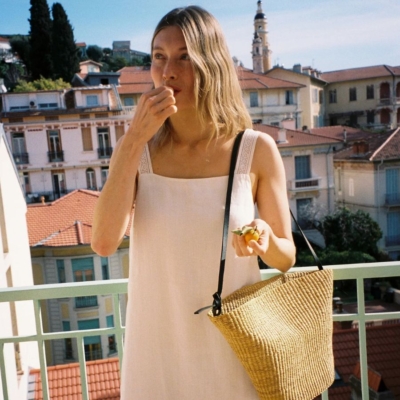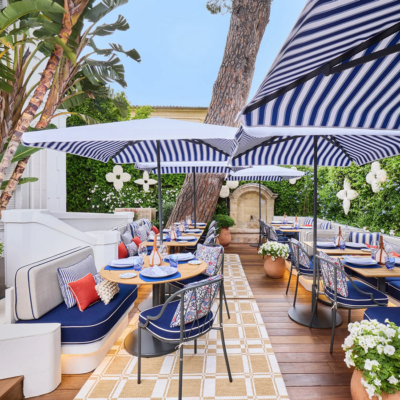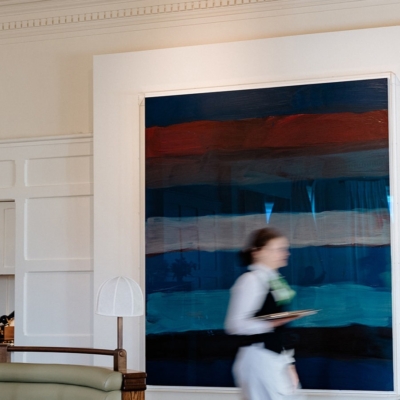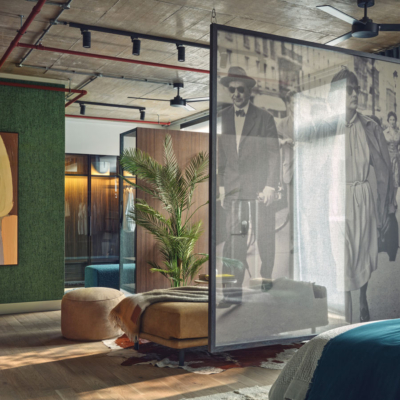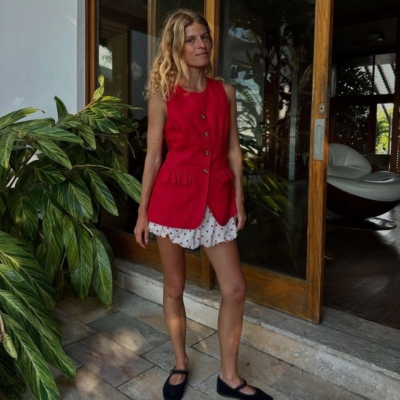Writer Carol Drinkwater’s Irish family is locked down in Laois. Without their usual visit to her home near Cannes, she’s decamped to work in northern France …
We are in the north of France, east of Paris, in a hamlet with neither tabac nor church, surrounded by mile after mile of golden, harvested wheat fields. The French call such out of the way spots, La France Profonde. Deep France. Agricultural territory. Here we have our offices and Michel, my husband’s editing suite. They are housed in a 13th-century big old grey box of a place where the plumbing and lighting are faulty and it will require fortunes to put matters to rights. I have nicknamed it the Mad Old Chateau, even though it is not a chateau. Far from it. Once upon a time, the property was grander. It had two towers. Now it has half a tower. The other one and a half were destroyed during the French Revolution when the farm labourers revolted and set fire to the estate house where resided their feudal lord. The house was intended to burn to the ground but being constructed of slabs of stone at least as large as anything you’d find at the Pyramids in Egypt, little was flammable and the building, save for its towers, survived.
When we first visited the place, it was in a very sorry state. Part of the roof had been blown off in a winter storm and there were leaks everywhere. We bought it for two reasons: Michel needed masses of storage space to store all the master copies of his films. We couldn’t afford Paris and this was being offered at a ridiculous price. Cheaper than a garage in Dublin!
We don’t live here, we more or less camp. As long as there is a dry place to sleep and cook up a meal we are content. And I have begun to discover the countryside in this region, as well as the fascinating history of many of the little villages and towns around. Brie cheese and Champagne territory. Medieval wars, German invasion.
The countryside is flat with vast unpolluted skies. Some days I could believe we were in the middle of the US, but of course, it is not quite that sprawling. At night, I listen to owls and stare in wonder at a sky that has more stars than I have seen anywhere else on earth. Truly. Last night I caught a shooting star (and made a wish). Surely a trailer for the Perseids, which should be in peak activity all this coming week. The population of the entire commune, an agglomeration of several hamlets, is 238. The mayor is a friend. We bring him bitter oranges from the Olive Farm and he makes us jam and orange wine and liqueur.
My mother loved it here in the Seine-et-Marne. She said it has the innocence and old-worldliness of her childhood on the outskirts of the village of Coolrain in Co Laois. Broods of chickens feeding in courtyards and out on the lanes where few cars pass.
It is hard some days to remind myself that we are only 80 kilometres from the capital. We have no television here, only screens for Michel to view his films, and our computers to keep us in touch. Otherwise, we live by the light and choose not to engage with much of what is going in with the outside world.
The only interruption to my writing hours is the putt-putting of the passing tractors along the street that leads east to the Champagne region and on towards Germany, and the coots splashing in the pond in the garden.
Down in the south on our Olive Farm, which overlooks the Bay of Cannes, the world and his wife are cruising the streets. The beaches are crowded now –especially this year after the government advised against travelling abroad. The French are enjoying their staycations all along the Côte d’Azur. As the holiday season approached, it seemed the ideal moment for us to drive north and work from this remote location, especially as we had been in confinement on the farm since mid-March.
The only interruption to my writing hours is the putt-putting of the passing tractors along the street that leads east to the Champagne region and on towards Germany, and the coots splashing in the pond in the garden.
It is high summer and the barbecue in the garden is working overtime. There are birds everywhere. Yesterday I spotted an electric blue kingfisher perched on the railing outside the kitchen window. Sometimes, very occasionally, a great grey heron swoops in to land. He stands like a stately old gentleman alongside the pond, gazing at the water, in search of fish of which there are none.
When I set out along the lanes for my evening walks, I say hello to at least half a dozen horses grazing in paddocks abutting village houses, two or three fawns sprinting across the harvested fields in the hope of making it to the next copse before a hunter catches sight of them. Grouse are regularly feeding at the grassy banks along the lanes. All are safe until the hunting season commences in October.
Spending a stretch of our midsummer up here is an experiment, going against the natural flow of the sun-seekers, although with the rising temperatures everywhere we are certainly not missing out on sunny days. For the past two weeks, it has been four or five degrees hotter here than along the Mediterranean coast where there is the relief of gentle sea breezes. This relentless heat with not a drop of rain in sight is a worry for the farmers. Drought stalks them. We observe them out in their tractors working until midnight; we hear them passing by again around five in the morning. The silos are turning almost non-stop. Gathering, haymaking, preparing the earth for whatever crop will go in next. It all happens in rotation here. These farmers work whatever hours are required to meet the huge demands of the capital and its environs, and to save the crops before they wither in this immense heat.
Here is a very different France to the one I have come to know so well in the south. The olive tree is drought-resistant, which has been one of its great strengths; one of the reasons it has survived and thrived over millennia. Here, the crops are more vulnerable.
We went out a few nights ago. An almost thrilling experience to get in the car and head off for somewhere after months of staying at home, protecting ourselves. We drove 15 minutes into the Champagne region to the small town of Étoges. Étoges was a stopover for kings and crusaders on their journey east. The town boasts a real chateau – nothing like our sorry example. However, it has also lost all but one of its towers. It is an excellent spot to take guests. Last year we had dear friends over from Offaly who enjoy a good glass of wine. It was the perfect outing; dinner at Le Chateau d’Étoges.
It’s not the best cuisine in France but it’s not at all bad and the chateau grounds, planted with some magnificent old trees, makes for a pleasant summer evening stroll. Follow it with a refreshing flute of champagne, sipped alongside the moat as the cool of evening finally begins to descend. The moat with its families of swans is fed by natural springs. The champagne the family serve is produced in the sloped vineyards that surround this small town. If you fancy an overnight, there are dozens of small family businesses producing their own sparkling wines in the area and, of course, the bottles are far more reasonably priced than the grand chateau labels.
So many of my family are back in lockdown in Laois and Offaly. I haven’t seen any of them since late last year. It’s heartbreaking. The best we could do was send selfies with the chateau in the background, wishing them well, keeping our fingers firmly crossed that before too long they will be here with us enjoying chilled French wine and long warm days of quietude.
Carol Drinkwater’s Olive Farm books are available in paperback. W&N £7.99.
LOVETHEGLOSS.IE?
Sign up to our MAILING LIST now for a roundup of the latest fashion, beauty, interiors and entertaining news from THE GLOSS MAGAZINE’s daily dispatches.






